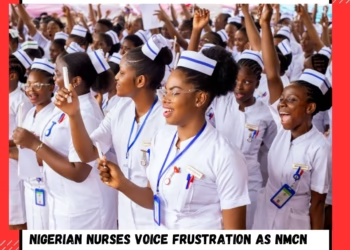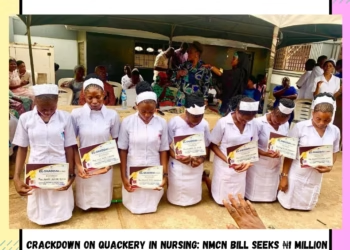As Nigeria enters day one of a five-day warning strike by the National Association of Resident Doctors (NARD), the country’s fragile healthcare system has once again been pushed to the edge. Resident doctors—who deliver up to 80% of clinical services in tertiary hospitals—have walked off duty, citing unpaid salaries, training funds, and allowances.
But behind the headlines about doctors lies another truth: nurses are bearing the brunt, left to manage overflowing wards with minimal physician support.
Why Are Doctors Striking?
Resident doctors began their strike at 8:00 a.m. on September 12, 2025, after a 10-day ultimatum expired. Their demands include:
– Immediate release of the 2025 Medical Residency Training Fund (MRTF)
– Payment of five months’ arrears under the Consolidated Medical Salary Structure (CONMESS) review
– Settlement of overdue 2024 allowances including call duty and accoutrements
Unless resolved, the strike will last until September 16. This marks the third major strike in 2025, highlighting deep cracks in a system where Nigeria’s health budget remains just 4.6% of GDP—far below the 15% Abuja Declaration target.

Nurses Left to Carry the System
With doctors off duty, the burden shifts almost entirely to nurses. Across hospitals in the Federal Capital Territory (FCT), from Nyanya General to Garki Hospital, nurses are triaging emergencies, stabilizing patients, and covering wards—often for 12 to 18 hours at a stretch.
A post on X summed it up bluntly: “No doctor services available—only some nurses and the record department on duty.”
The consequences are severe:
– Nurse-to-patient ratios in Nigeria are already poor.
– Ethical distress is rising as nurses are forced to ration care.
– Burnout is worsening, with many questioning how long they can hold on.
In Zamfara, nurses excluded from new salary enhancements have warned of their own strike—even as a cholera outbreak spreads.
A Human Toll: Patients Caught in the Middle
The patients, as always, pay the highest price.
– At Garki Hospital, a stroke patient waited hours for a consultant, stabilized only by nurses but discharged prematurely due to staff shortages.
– Maternal care is at risk: Nigeria already contributes 20% of global maternal deaths, and strike-related delays push these numbers higher.
– Rural patients are turned away or forced into expensive private clinics.
A health policy expert warned: “This isn’t just a strike—it’s a preview of collapse.”
Why Nurses Are Burning Out
Nigeria’s nursing workforce has been decimated by emigration. Over 42,000 nurses have left in recent years, chasing better pay abroad (₦150,000–₦300,000 at home vs. £28,000+ in the UK).
Those who remain face unsafe working conditions, exemplified by the recent death of a nurse at Abaji General Hospital after a snake bite due to poor safety measures.
The strike intensifies this exodus, leaving nurses on the ground demoralized, overworked, and underpaid.
Systemic Rot in the Health Sector
The strike is not an isolated event—it reflects decades of underfunding and neglect.
– Since 2022, over 16,000 doctors and 42,000 nurses have left Nigeria.
– States like Oyo and Zamfara owe months of back pay to nurses.
– Federal promises of better infrastructure and funding remain largely unfulfilled.
Even reforms like abolishing the “three-exam-failure dismissal policy” for nursing students fail to address the bigger problem: retention of skilled professionals.
A Roadmap to Recovery
Fixing Nigeria’s health sector will require both immediate action and long-term reform:
– Immediate: Pay arrears of MRTF and CONMESS to end the strike before September 16.
– Short-Term: Implement hazard allowances and enforce 1:500 nurse-to-patient ratios.
– Long-Term: Commit to raising health spending to 15% of GDP by 2027, with incentives to retain nurses and doctors.
Dialogue between NARD, NANNM (National Association of Nigerian Nurses and Midwives), and government must be strengthened to prevent inter-professional rifts.
Nurses’ Plea: “Don’t Let Us Break”
Nurses deliver nearly 80% of primary care in Nigeria. Yet today, they are holding together a collapsing system, often at the cost of their health and safety.
This strike should be more than another cycle of demands and concessions—it should be the wake-up call that Nigeria can no longer afford to ignore.
Nurses do not need more applause for their resilience. They need support, fair pay, safe workplaces, and policies that value their role as the backbone of healthcare.
Join the Conversation:
Are you a nurse, doctor, or patient affected by the strike? Share your experiences in the comments.










